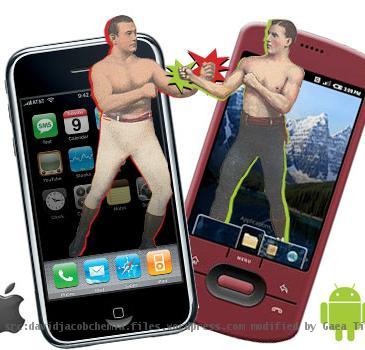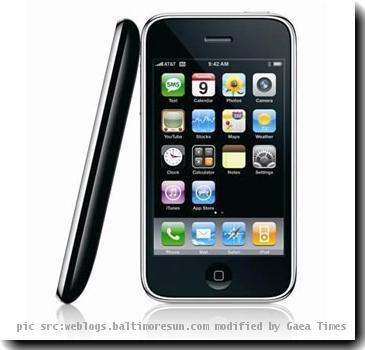With Apple’s fans, iPhone maker may not need to respond to Consumer Reports critique
By Joel Schectman, APTuesday, July 13, 2010
Apple silent after Consumer Reports critique
SEATTLE — A decision by Consumer Reports against endorsing the latest iPhone because of reception problems threatens to tarnish Apple Inc.’s reputation, yet fans who have braved poor reception for years are likely to keep buying the product.
In fact, some analysts say Apple could simply ignore calls by bloggers and others to recall the iPhone 4 or offer free cases to mitigate the problems.
As of Tuesday evening, Apple hadn’t returned phone calls or e-mails about the Consumer Reports critique, which the venerable arbiter of product quality posted on its website Monday. While some Apple watchers find the company’s responses to the reception issue objectionable, they don’t see any penalties for Apple if it does nothing further.
People buy iPhones for emotional reasons, not because they’re the best phones, said Deborah Mitchell, executive director of the Center for Brand and Product Management at the University of Wisconsin.
“People see you using the iPhone, and they think you are a certain type of person — hip, fresh and youthful in attitude,” she said. “It’s a brand that helps you identify yourself.”
The iPhone has also been ahead of competitors when it comes to features such as easy Web browsing and shopping for music, movies and applications to download.
Greg Brown, a retired Philadelphia Eagles football player who lives in Sicklerville, N.J., said he has overlooked the iPhone’s propensity for dropping calls because of congestion on the network of AT&T Inc., the iPhone’s exclusive U.S. wireless carrier.
“When I am talking on the phone I like to finish the conversation before the phone call ends,” Brown said. “But I forgive it because of all the features.”
Consumer Reports said it won’t endorse the iPhone 4 as “recommended” because tests show that simply holding the gadget can cause reception to fade. Although Consumer Reports only recommends a handful of phones that it considers exceptional, this was the first time the publication isn’t giving an iPhone its “recommended” stamp of approval.
The publication’s tests confirmed suspicions from many iPhone customers. Hours after the iPhone 4 launched on June 24, people were writing on Apple’s support website that gripping the phone a certain way made it show fewer “bars” of cell signal strength and even caused calls to disconnect.
The company’s first response came in a curt note attributed to CEO Steve Jobs, who told one iPhone buyer to either hold the phone a different way or buy a case.
After complaints persisted, Apple issued a formal letter saying an illusion caused by software was the culprit. For years, the iPhone had been showing people too many bars, a problem Apple says it plans to fix with a software update. At least then, dropped calls in areas with weak networks wouldn’t come as a surprise.
Apple also said all phones, not just the iPhone, have reception problems when a user’s hand covers the antenna.
Consumer Reports, however, believes Apple is dodging responsibility for a larger hardware problem.
This doesn’t mean Consumer Reports believes the iPhone 4 is all bad, editor Mike Gikas said. It outperformed every other smart phone on the market in other regards. And avoiding the problem is as simple as buying a $30 “bumper” case from Apple that goes around the edges. Consumer Reports says even a simple a strip of duct tape would work (though one can imagine Jobs shuddering at such aesthetic blasphemy).
“It’s like finding a dream home but then finding a leak in the basement,” Gikas said.
Carolina Milanesi, an analyst for Gartner Inc., said she believes Jobs’ early e-mail was an atypical public-relations blunder on Apple’s part.
“Reception is pretty crucial. You can’t tell people, ‘You can’t hold the phone that way,’” Milanesi said.
A year or two ago, his comments might have prompted jokes, she said. But now, Apple is the world’s largest technology company by market capitalization, and Jobs’ remarks are being perceived as arrogant. But while that could turn off new customers, Milanesi thinks most people won’t recall this flap when it comes time to buy an iPhone 4 — more likely, they’ll be agonizing over whether to buy the white or black model.
Brian Marshall, a Gleacher & Co. analyst who is typically very positive about Apple, was horrified when Apple said it had used a bad formula for calculating signal strength.
“That, to me, is atrocious,” Marshall said. “It’s so un-Apple-like. It shows a lack of attention to detail. Apple is a company that doesn’t mess things up.”
But neither Marshall nor Milanesi see the matter hurting Apple in the long run, even though its shares slipped about 2 percent to close Tuesday at $251.80.
Marshall said the most likely scenario is that Apple does nothing beyond the software update it promised. Offering free cases or issuing a recall would amount to Apple admitting a problem.
“I don’t believe for a second that they’re shipping what they view as a faulty product,” Marshall said.
Even if Apple does go beyond a software update, it’s not likely to hurt the company.
“We think $100 million here and there for a bumper or maybe a recall is a drop in the bucket for Apple,” Standard & Poor’s equity analyst Clyde Montevirgen said. “Sure, it might affect the company on a headline level, but from a financial standpoint we really don’t see much of an impact.”
Schectman reported from New York. AP Online Video Producer Luke Sheridan contributed to this report.
Tags: Computing And Information Technology, North America, Seattle, Software, United States, Washington

